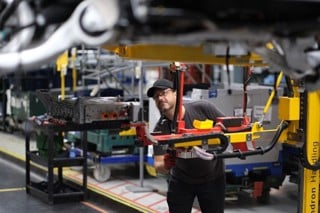There were 425,861 new cars registered in the key month of September, a rise of 5.6% and the biggest September since 2004, says the Society of Motor Manufacturers and Traders (SMMT).
Registrations to fleet and business accounted for 204,715 units – 48% of the overall market – compared to 194,272 units registered in the same month last year - a 5.3% increase.
Year-to-date, fleet and business registrations have now broken through the one million car barrier, with 1,001,815 units registered since the start of the year, equating to more than half of the overall market (51.1%) and an 8.2% increase on fleet and business volumes in the first nine months of 2013.
The new ‘64’ number plate has boosted volumes, with September marking the 31st consecutive month of growth in the new car market.
Mike Hawes, SMMT chief executive, said: "September’s strong performance underlined the continuing robustness of the UK new car market, particularly in the context of last September’s bumper volumes.
"Demand for the new 64-plate has been boosted by intensifying confidence in the UK economy, with consumers attracted by a wide range of exciting, increasingly fuel-efficient, new cars. In the months since March – which saw an 18% jump in registrations – the growth has shown signs of levelling off as the market starts to find its natural running rate."
Registrations for the year-to-date reached 1,958,196 – up 9.1% on January-September 2013 and SMMT’s figures suggest that September and March – the months of the plate change – together accounted for a third of a year’s registrations.
David Raistrick, UK Automotive Leader at Deloitte, said: “If the new car sales are representative of the performance of the UK economy, there are further signs that confidence within the business sector is improving.
“Fleet and business car sales are now seeing the sort of growth that has been provided by private sales over the past two and half years. This contributed to diesel sales exceeding petrol sales at the end of August, though the private buyer continues to be attracted by the lower fuel consumption levels offered by diesel power.
“Looking back twelve months, little seems to have changed in the way that the UK and European automotive markets are performing.
“The UK market has consolidated its position as the second largest market for new cars after Germany and is almost a third larger than France in third place.
“The German market has returned to growth but at a significantly lower level than the UK as it continues to be affected by weaker performance in the wider European market.
“From a production perspective, even with extended factory shut downs during August, UK production levels were up 1% on 2013 with nearly 83% of all UK manufactured cars being for the exported market.”























Mr.Bean - 06/10/2014 12:16
We should be very concerned with these numbers. The used market will sadly suffer from this with some expecting a 3% to 5% drop for 2015. Manufacturers are to blame on this with very high discounts and short term deals.